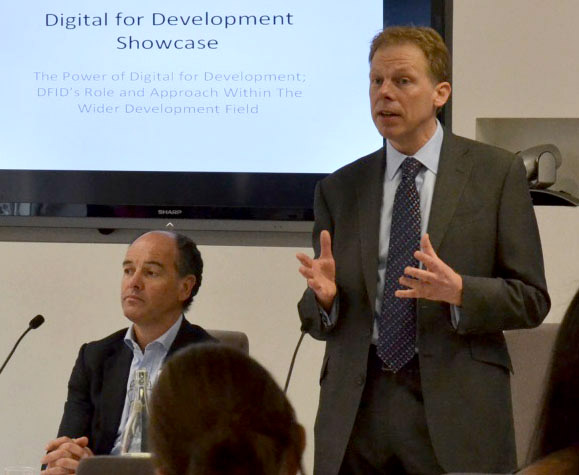The DFID Digital Advisory Panel is now just over a year old – and as we approach our 6th meeting we thought it was a good time to reflect on what has happened and outline some plans for possible future work.
The existence of the Panel has done a lot to raise the profile of digital both in DFID and externally. Panel members challenge us in a constructive and beneficial way – an external view is definitely welcome in bringing a new perspective to things we are perhaps too close to see.
Members offer their time to follow up on issues outside meetings and we value their expertise and experience.
The Digital for Development Day saw members sit in on discussion panels, give presentations and contribute provocative and extremely valuable insights into our digital work. All their inputs were well received.

The presentations the Panel request are helpful and informative for DFID staff too. Material prepared for them has often been reused many times for different audiences.
What about the substance of their discussions? As with any new group which was starting completely fresh, with no precedent to follow and a reasonably open agenda, the first 2 meetings were about setting the scene: opportunities for members to find out about our priorities, and there were lots of challenge and questions.
The panel quickly focussed on 3 major areas: management information, digital capability and how we use digital in our programmes.
On the first, the question was whether the management information we have is fit for purpose. At the time of asking, the answer was no – a lot of shaping is needed, and much effort is spent in gathering and preparing material. A project has now been in place for a year with the aim of reducing individual inputs and enabling time for proper analysis. It is delivering products – including dashboards, which are absolutely what people need.
On capability, a simple question: Do we have the capability in place to work effectively in a fast changing world? - has a very complex answer. And before we can make plans to help people develop new skills, we needed to assess where we are now. So the Panel advised us as we developed the Digital Quiz (more about this in future blog post) and given examples from their different experiences of introducing skills programmes.
On the final question, of how we use digital in our programmes, the Panel asked some searching questions which resulted in the commissioning of a review. This took place towards the end of 2014 and the results have been shared around the organisation (and will be the subject of another blog post very soon).
Along the way we have also given demonstrations of a range of different digital projects and presentations on proposals and have always received detailed questions and insight.
With that glowing report card in hand, now is a good opportunity to think about some areas we might cover during 2015. This is a momentous year for the international development community, as the Millennium Development Goals reach their maturity date, and discussions take place as to what will replace them. 2015 will also offer opportunities for those who work in central government as we look ahead to after the election and plan for a new digital strategy as the current ones reach their end. We also have a new Digital Leader in DFID, as Nick Dyer has taken over the role from Richard Calvert. Nick is looking for opportunities to promote the digital agenda and I hope we will see blogs from him in the future too.
Keep in touch. Sign up for email updates from this blog, or follow Julia on Twitter.

Recent Comments